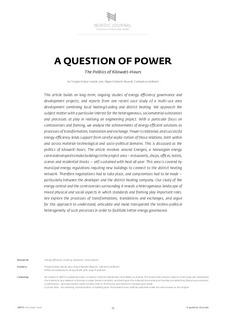| dc.description.abstract | This article builds on long-term, ongoing studies of energy efficiency governance and development projects, and reports from one recent case study of a multi-use area development combining local heating/cooling and district heating. We approach the subject matter with a particular interest for the heterogeneous, sociomaterial substances and processes at play in realising an engineering project. With a particular focus on controversies and framing, we analyse the achievements of energy efficient solutions as processes of transformation, translation and exchange. Power is relational, and successful energy efficiency lends support from careful exploitation of those relations, both within and across material-technological and socio-political domains. This is discussed as the politics of kilowatt-hours. The article revolves around Energeo, a Norwegian energy central developed to make buildings in the project area – restaurants, shops, offices, hotels, scenes and residential blocks – self-sustained with heat all year. This area is covered by municipal energy regulations requiring new buildings to connect to the district heating network. Therefore negotiations had to take place, and compromises had to be made – particularly between the developer and the district heating company. Our study of the energy central and the controversies surrounding it reveals a heterogeneous landscape of mixed physical and social aspects in which standards and framing play important roles. We explore the processes of transformations, translations and exchanges, and argue for this approach to understand, articulate and make transparent the techno-political heterogeneity of such processes in order to facilitate better energy governance. | |
